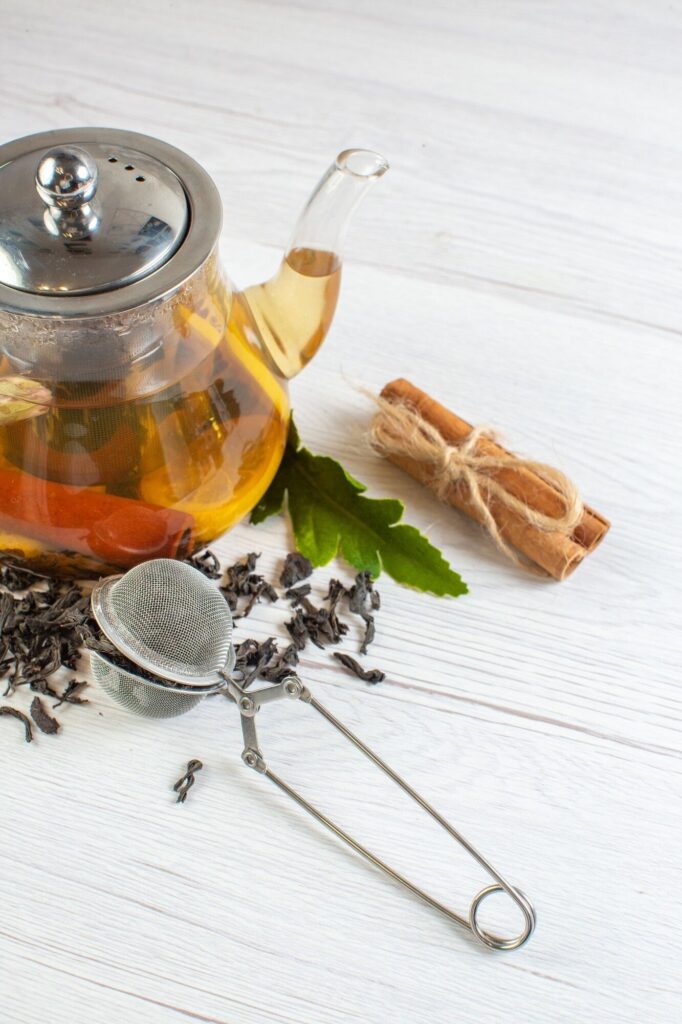
Mushroom tea is an ancient and versatile beverage, celebrated for its unique flavors and health benefits. With roots in various cultures around the world, it has gained popularity as a natural way to enhance well-being. This guide will cover everything you need to know about mushroom tea, from the types of mushrooms used and their benefits to preparation methods, safety tips, and more.
What is Mushroom Tea?
Mushroom tea is a drink made by steeping different types of mushrooms in hot water. Unlike traditional teas made from Camellia sinensis leaves, mushroom tea utilizes the medicinal properties of the fungus. The result is a drink that offers more than just a distinctive flavor—it’s a powerhouse of nutrients that can provide multiple health benefits, depending on the type of mushroom used. This unique blend can be used alone or mixed with other herbs and spices to create a comforting, flavourful and healthy drink.
Types of Mushrooms Used in Tea
1. Chaga
Known as the “King of Medicinal Mushrooms,” Chaga is known for its high antioxidant content and immune-boosting properties. This mushroom grows mainly on birch trees in cold climates and has been used in traditional medicine for centuries, especially in Russia and Northern Europe. Chaga tea has a slightly bitter, earthy flavor, making it a popular choice for those looking to naturally support their immune system. Antioxidants in chaga are believed to combat oxidative stress, which can reduce inflammation and support overall health.
2. Reishi
Often referred to as the “Mushroom of Immortality,” Reishi is celebrated for its stress-relieving and immune-boosting properties. Reishi has been used in traditional Chinese medicine for over 2,000 years and is known for its calming effects on the mind and body. Tea made from reishi mushrooms has a bitter, woody flavor that reflects its health benefits. It is a great choice for those who want to manage stress, anxiety, and even sleep disorders. Regular consumption of reishi tea is believed to promote longevity and overall health.
3. Lion’s Mane
Known for its cognitive benefits, tiger’s mane supports mental health and improves memory. This unique mushroom, named for its long, cascading tendrils, has been used in traditional Chinese and Japanese medicine for centuries. The tea has a mild, slightly sweet taste, making it a pleasant and effective way to enhance cognitive function. Studies show that Lion’s Mane can stimulate brain cell growth and protect against neurological diseases, making it an excellent choice for those interested in increasing mental clarity and focus.
4. Cordyceps
Traditionally used in Chinese medicine, Cordyceps is valued for its ability to increase energy levels and athletic performance. This parasitic fungus grows on insect larvae and has been prized for its medicinal properties for centuries. Its tea has a mildly sweet flavor with a hint of earthiness, making it an approachable one for those seeking a natural energy boost. Cordyceps is believed to increase the body’s production of ATP, the molecule responsible for energy transfer within cells, making it popular among athletes and those with active lifestyles.
5. Turkey Tail
This colorful mushroom, named after its resemblance to turkey tail feathers, is rich in polysaccharides, which support the immune system. Turkey tail has a long history of use in traditional Chinese medicine, particularly for its ability to boost the body’s defenses against infection. Turkey tail tea is mild with slightly sweet and earthy flavors, making it a gentle yet effective option for immunity. It is often recommended as a complementary treatment for those undergoing chemotherapy, as it can help improve immune function.
Health Benefits of Mushroom Tea
Mushroom tea is more than just a hot drink. It is a nutritional powerhouse. Depending on the type of mushroom, it can offer a wide range of health benefits, making it a valuable addition to your daily routine.
- Immune Support: Many medicinal mushrooms, such as chaga and turkey tail, contain beta-glucans, which are natural compounds that help strengthen the immune system. Regular consumption of these teas can help your body fight diseases more effectively.
- Stress Relief: Adaptogenic mushrooms like reishi help the body manage stress and anxiety by regulating the body’s hormonal response to stress. This can lead to improved mood, better sleep and an overall sense of well-being.
- Cognitive Enhancement: Tiger’s mane is known for its ability to support neurogenesis, the process by which new neurons are formed in the brain. It can enhance memory, cognitive function, and even protect against age-related cognitive decline.
- Energy Boost: Cordyceps is known for its ability to increase ATP production, providing a natural energy boost without the jitters associated with caffeine. This makes it an excellent choice for those looking to increase stamina and endurance.
- Anti-Inflammatory Properties: Many mushrooms, including chaga and reishi, contain powerful antioxidants that help reduce inflammation throughout the body. It can reduce the risk of chronic diseases, improve heart health, and promote overall health.
How to Make Mushroom Tea
Making mushroom tea is a simple process that can be done using fresh, dried or powdered mushrooms. Here’s how you can make your own mixture at home:
- Choose Your Mushroom: Choose the type of mushroom based on your desired benefits. You can use one type or combine different mushrooms to combine their effects.
- Prepare the Mushrooms: If using fresh or dried mushrooms, cut them into small pieces to increase the surface area for extraction. For powdered mushrooms, no preparation is required, as they dissolve easily in water.
- Bring water to a Boil: Bring water to a boil, then reduce to a simmer. The amount of water will depend on how strong you want the tea to be. Generally, one cup of water per serving is standard.
- Steep the Mushrooms: Put the mushrooms in boiling water and let them steep for 10-15 minutes. The longer you steep, the stronger the flavor and benefits. For a more potent blend, you can steep the tea for up to 30 minutes.
Strain and Serve: Strain the liquid into a cup, reserving the mushroom pieces. You can enhance the flavor by adding honey, lemon or other herbs. For a creamier texture, consider adding a splash of milk or a dairy-free alternative.

Exploring Different Flavors and Variations
Mushroom tea is extremely versatile, allowing you to experiment with different ingredients to suit your taste preferences. The combinations are endless, and you can tailor the tea to your specific needs or mood.
- Spices: Add heat and depth to your mushroom tea by adding spices like cayenne, black pepper, ginger, or cinnamon. These spices not only enhance taste but also add additional health benefits, such as improved digestion and circulation.
- Herbs: Add fresh or dried herbs such as mint, basil or rosemary for freshness. These herbs can complement the earthy flavors of the mushrooms and provide additional therapeutic effects.
- Flowers: For a delicate, floral note, consider adding flowers like chamomile, lavender or hibiscus. These can sweeten the tea naturally and create a relaxing and aromatic experience.
- Sweeteners: If you prefer a sweeter taste, natural sweeteners such as honey, maple syrup or stevia can be added. These sweets blend well with the earthy colors of the mushrooms.
Tips for Safe Consumption
Although mushroom tea is generally safe for most people, there are a few safety issues to keep in mind to ensure a positive experience.
- Start Slow: If you’re new to mushroom tea, start with a small amount to see how your body reacts. Each type of mushroom has different effects, and it’s important to understand how your body reacts before adding it to your diet.
- Consult a Healthcare Provider:If you have underlying health conditions, are taking medications, or are pregnant, it is important to consult a healthcare provider before consuming mushroom tea. Some mushrooms may interact with medications or are contraindicated for certain conditions.
- Quality Matters: Use high-quality, organic mushrooms to ensure you’re getting the full benefits without the harmful chemicals. Getting your mushrooms from reputable suppliers can make a significant difference in the efficacy and safety of your tea.
Potential Interactions: Be aware that certain mushrooms, such as chaga, may interact negatively with blood-thinning medications (eg, aspirin) and insulin. Pregnant or breastfeeding women should avoid chaga mushrooms as they can affect breast milk. Chaga is also known to activate the immune system, so people with autoimmune diseases such as lupus, multiple sclerosis, or rheumatoid arthritis should avoid chaga and reishi mushrooms at all costs.
Mental and Physical Effects of Psilocybin Mushroom Tea
Psilocybin mushrooms, commonly known as magic mushrooms, can also be consumed as a tea. However, it is important to understand the potential mental and physical effects of consuming psilocybin mushroom tea, as these may be quite different from the effects of medicinal mushrooms.
Mental Effects
The psychoactive effects of psilocybin mushroom tea are some of the most sought-after experiences, but they can vary greatly from person to person. Positive effects may include:
- Increased creativity
- enthusiasm
- Improved mood and happiness
- Deep introspection and spiritual experiences
However, there are also potential negative psychological effects, such as:
- Panic attacks
- Mistrust
- Anxiety
- Get Confused
- Paranoia
The mindset and environment in which psilocybin tea is consumed play a significant role in determining the nature of the experience. A negative environment or mindset can lead to a “bad trip”, which can be difficult to manage once it starts.
Physical Effects
When using psilocybin mushroom tea, you may experience a variety of physical side effects, including:
- Vomit
- Increased heart rate
- Urinary incontinence
- Nausea
- High blood pressure
These effects may make magic mushroom tea less appealing to some people. It is important to be aware of these potential side effects and approach Psilocybin tea with caution.
Conclusion
Mushroom tea is a versatile and health-promoting drink that can improve your daily routine. From immune-boosting chaga to cognition-enhancing tiger’s mane, all types of mushrooms offer unique benefits and flavors. Whether you’re looking to manage stress, boost energy, or support mental health, there’s a mushroom tea to suit your needs. By understanding the different mushrooms, their effects, and safe consumption methods, you can enjoy the full potential of mushroom tea. As with any health product, careful use and consultation with a healthcare professional is key to maximizing benefits and ensuring safety.




